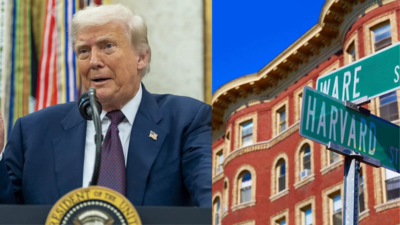ARTICLE AD BOX

Days after the Supreme Court handed the Trump administration a major win allowing federal agencies to proceed with cuts to diversity-related grants, the administration has turned its sights on another high-profile target: Harvard University.
According to The Harvard Crimson, the unfolding legal battle involves nearly $3 billion in federal research funding. The clash underscores a growing tension between federal policy and academic autonomy, with both sides staking claims that could reshape the future of university funding and research priorities.
Supreme Court ruling gives Trump administration leverage
On Thursday, the Supreme Court overruled lower courts that had blocked the termination of more than $780 million in research funding from the National Institutes of Health. The ruling found that the US District Court for Massachusetts likely lacked jurisdiction to review the terminations, which aimed to cut funding for research linked to diversity, equity, inclusion, gender, race, and vaccine hesitancy, according to The Harvard Crimson. The Trump administration quickly leveraged this decision in its argument that Harvard’s April lawsuit should be moved to the US Court of Federal Claims, which handles monetary claims against the federal government. “The Supreme Court has now confirmed Defendants’ interpretation and rejected the primary authority on which Plaintiff relies for its jurisdictional argument,” government lawyers wrote in a Saturday filing, as reported by The Harvard Crimson.
Harvard resists, citing First Amendment and procedural claims
Harvard has pushed back, insisting that its case involves far more than a simple monetary claim. The University argues that the Trump administration violated its First Amendment rights and failed to follow procedural requirements under federal law for canceling grants. Judge Allison D. Burroughs, presiding over the case, has expressed skepticism about the government’s push to transfer the suit. At a July hearing, she questioned how Harvard’s constitutional claims could be considered if the case were moved out of district court. On Sunday, Harvard reiterated that it seeks an injunction against future retaliatory grant cuts and is challenging the legality of the administration’s underlying policies, not just the restoration of lost funds, as reported by The Harvard Crimson.
A split Supreme Court adds complexity
The Supreme Court itself was divided on the issue. A five-justice majority allowed the Trump administration to proceed with grant cancellations, while another five-justice group ruled that the policy directing the terminations was likely unlawful and should be stayed. Justice Amy Coney Barrett was the sole justice to appear in both majorities, writing that while the policy behind the cuts was probably illegal, challenges to individual grant terminations must be heard in federal claims court, according to The Harvard Crimson. The Trump administration’s filings for Harvard’s case leaned heavily on Barrett’s opinion, emphasizing that claims challenging agency guidance can be separated from claims seeking payment. “This case does not involve binding agency guidance; rather, Harvard seeks only payment of money from individual grant terminations,” the lawyers wrote, as reported by The Harvard Crimson.
Potential stakes: Billions in funding and ongoing negotiations
If Harvard prevails, it could see billions of dollars in research funding restored, easing pressure on scientists and scholars already facing tightened budgets and a recently increased endowment tax.
Yet, the University may not see a court resolution at all. Negotiations between Harvard and the White House restarted in June, and recent reports suggest the administration has proposed a deal costing upwards of $500 million.
Harvard’s president previously expressed skepticism about that price tag, though the University is reportedly considering a settlement that would fund vocational and educational programs, as reported by The Harvard Crimson.
What this means for academia
The Harvard-Trump legal battle is more than a fight over dollars. It touches on First Amendment protections, the limits of federal authority, and the future of diversity-related research funding in the United States. For universities, the case highlights the fragility of federal support and the importance of legal advocacy in defending both academic freedom and research priorities. As the case continues, students, researchers, and policymakers alike are watching closely, knowing that the outcome could set a precedent for how federal agencies interact with leading academic institutions.TOI Education is on WhatsApp now. Follow us here.



.png)
.png)
.png)
















 4 hours ago
3
4 hours ago
3








 English (US) ·
English (US) ·